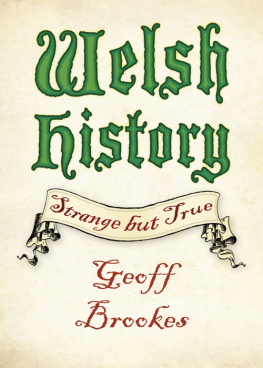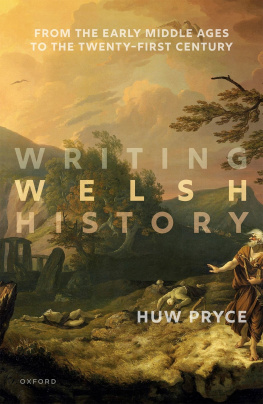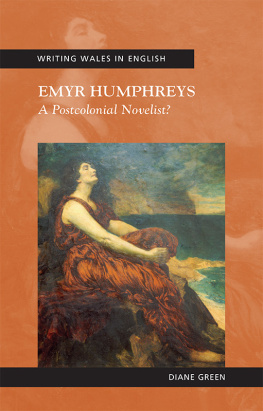B ETWEEN W ALES AND E NGLAND
WRITING WALES IN ENGLISH
CREW series of Critical and Scholarly Studies
General Editors: Kirsti Bohata and Daniel G. Williams ( CREW , Swansea University)
This CREW series is dedicated to Emyr Humphreys, a major figure in the literary culture of modern Wales, a founding patron of the Centre for Research into the English Literature and Language of Wales . Grateful thanks are due to the late Richard Dynevor for making this series possible.
Other titles in the series
Stephen Knight, A Hundred Years of Fiction (978-0-7083-1846-1)
Barbara Prys-Williams, Twentieth-Century Autobiography (978-0-7083-1891-1)
Kirsti Bohata, Postcolonialism Revisited (978-0-7083-1892-8)
Chris Wigginton, Modernism from the Margins (978-0-7083-1927-7)
Linden Peach, Contemporary Irish and Welsh Womens Fiction (978-0-7083-1998-7)
Sarah Prescott, Eighteenth-Century Writing from Wales: Bards and Britons (978-0-7083-2053-2)
Hywel Dix, After Raymond Williams: Cultural Materialism and the Break-Up of Britain (978-0-7083-2153-9)
Matthew Jarvis, Welsh Environments in Contemporary Welsh Poetry (978-0-7083-2152-2)
Harri Garrod Roberts, Embodying Identity: Representations of the Body in Welsh Literature (978-0-7083-2169-0)
Diane Green, Emyr Humphreys: A Postcolonial Novelist (978-0-7083-2217-8)
M. Wynn Thomas, In the Shadow of the Pulpit: Literature and Nonconformist Wales (978-0-7083-2225-3)
Linden Peach, The Fiction of Emyr Humphreys: Contemporary Critical Perspectives (978-0-7083-2216-1)
Daniel Westover, R. S. Thomas: A Stylistic Biography (978-0-7083-2413-4)
Jasmine Donahaye, Whose People? Wales, Israel, Palestine (978-0-7083-2483-7)
Judy Kendall, Edward Thomas: The Origins of His Poetry (978-0-7083-2403-5)
Damian Walford Davies, Cartographies of Culture: New Geographies of Welsh Writing in English (978-0-7083-2476-9)
Daniel G. Williams, Black Skin, Blue Books: African Americans and Wales 1845 1945 (978-0-7083-1987-1)
Andrew Webb, Edward Thomas and World Literary Studies: Wales, Anglocentrism and English Literature (978-0-7083-2622-0)
Alyce von Rothkirch, J. O. Francis, realist drama and ethics: Culture, place and nation (978-1-7831-6070-9)
Rhian Barfoot, Liberating Dylan Thomas: Rescuing a Poet from Psycho-Sexual Servitude (978-1-7831-6184-3)
Daniel G. Williams, Wales Unchained: Literature, Politics and Identity in the American Century (978-1-7831-6212-3)
M. Wynn Thomas, The Nations of Wales 1890 1914 (978-1-78316-837-8)
Richard McLauchlan, Saturdays Silence: R. S. Thomas and Paschal Reading (978-1-7831-6920-7)
Between Wales and England
Anglophone Welsh Writing
of the Eighteenth Century
WRITING WALES IN ENGLISH
Bethan M. Jenkins

UNIVERSITY OF WALES PRESS
2017
Bethan M. Jenkins, 2017
All rights reserved. No part of this book may be reproduced in any material form (including photocopying or storing it in any medium by electronic means and whether or not transiently or incidentally to some other use of this publication) without the written permission of the copyright owner. Applications for the copyright owners written permission to reproduce any part of this publication should be addressed to the University of Wales Press, 10 Columbus Walk, Brigantine Place, Cardiff CF10 4UP.
www.uwp.co.uk
British Library CIP Data
A catalogue record for this book is available from the British Library
ISBN: 978-1-7868-3029-6 (hardback)
ISBN: 978-1-7868-3030-2 (paperback)
eISBN: 978-1-7868-3032-6
The right of Bethan M. Jenkins to be identified as author of this work has been asserted in accordance with sections 77 and 79 of the Copyright, Designs and Patents Act 1988.
The publisher acknowledges the financial support of the Welsh Books Council.
Cover image The Bard (1774), Thomas Jones National Museum Wales
Yn gyflwynedig i mam, ac er cof am fy nhad
C ONTENTS
A CKNOWLEDGEMENTS
This book has lived with me in various shapes and forms since I was a Masters student. During that course, and subsequently my doctoral studies, I was funded by the Arts and Humanities Research Council, and the foundations of this work grew out of the research I was able to undertake with its support. I am supremely grateful to my first supervisor, Nicolas Jacobs, who introduced me to the works of J. R. Jones and the concepts of Prydeindod ; and following his retirement, to my second supervisor, Freya Johnston, for her guidance in bringing my thesis to completion. Thanks must also go to my colleagues at the Bodleian History Faculty Library and the Radcliffe Camera of the Bodleian Library for employment, and encouragement with my on going studies there are, after so many years, too many of you to mention, but know that you all have my thanks. Many segments of this book first saw the light of day at the conferences held by the British Society for Eighteenth-Century Studies, the Association for Welsh Writing in English, and the University of Wales Centre for Advanced Welsh and Celtic Studies. I am grateful in particular to the latter institution for the opportunity to work on the projects Iolo Morganwg and the Romantic Tradition in Wales and Wales and the French Revolution, both enjoyable and stimulating experiences. The list of those who have with kindness and generosity given encouragement in various ways to my studies is long, and I would like to thank Jane Aaron, Dinah Birch, Cathryn Charnell-White, Mary-Ann Constantine, Geraint H. Jenkins, Dafydd Johnston, David Ceri Jones, Ffion Mair Jones, Marion Lffer, Jan Martin, Murray Pittock, Sarah Prescott, Rita Singer, Heather Williams and Margaret Williams who have each helped me along my way. Particular thanks must go to Gesine Bruss, Mary Chadwick, Lyn Jones and Milo Thurston, all of whom have borne more than their fair share of my fretting over this volume; like wise Llion Wigley of the University of Wales Press, who has shown great patience with me over the last few years, and Leah Jenkins for imposing order on my chaos. I am grateful to the general editors for allowing me a place in this series, and I am especially grateful to M. Wynn Thomas for his encouragement and his generous, meticulous and careful editorship; Welsh studies has no finer champion. Any errors remaining after his keen scrutiny are mine alone. Final thanks go to my parents, Tudor and Susan, who made many sacrifices to give me two languages and a love of my country; it is to them that this book is dedicated.










